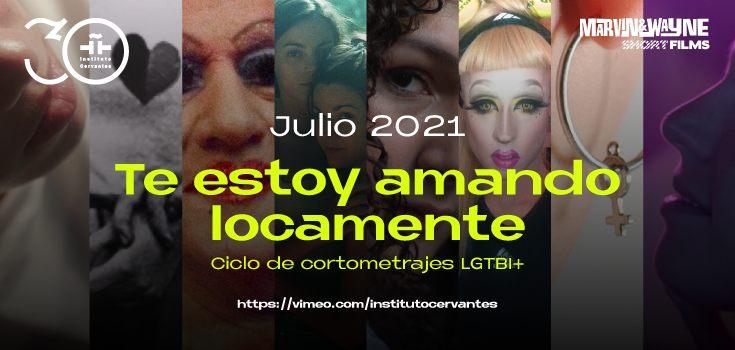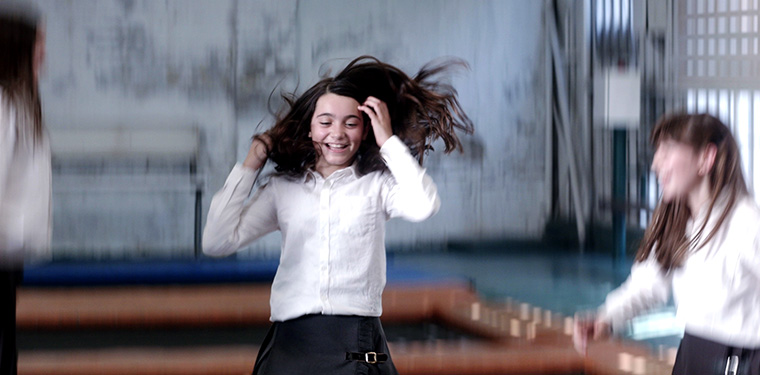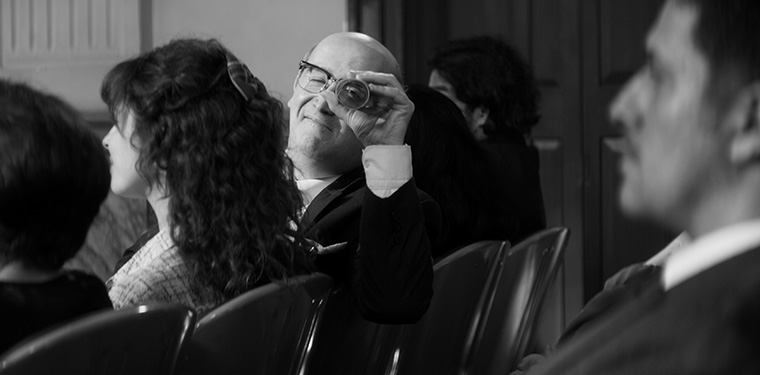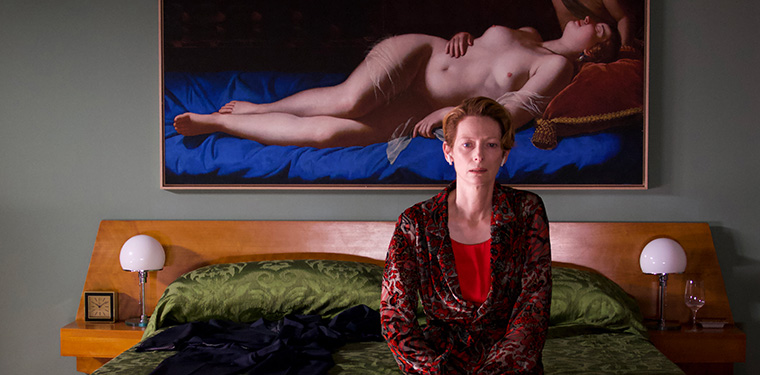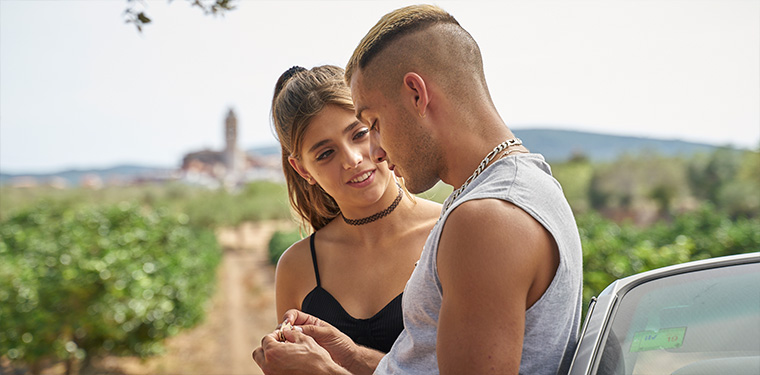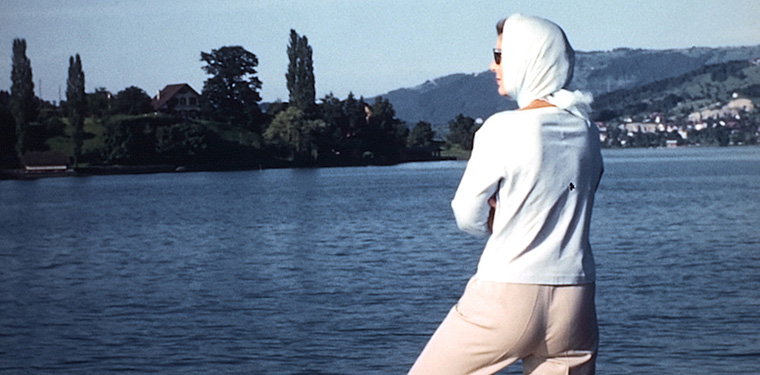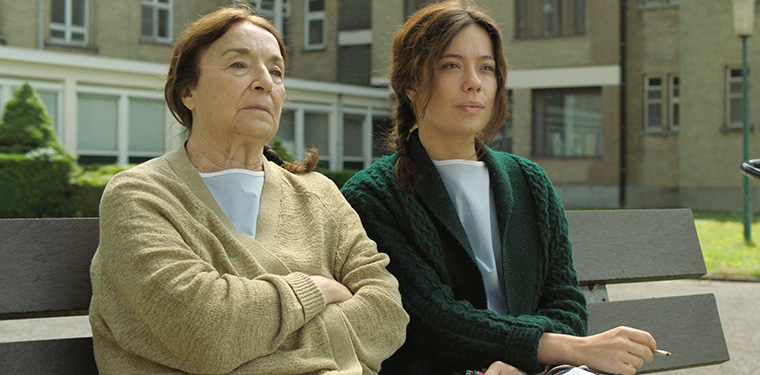The Year of Discovery at Open City Docs
We are proud to support the screening of The Year of Discovery at Open City Docs Festival. The film proposes a counter-narrative to the official history of 1992, the year Spain hosted the Olympics in Barcelona.
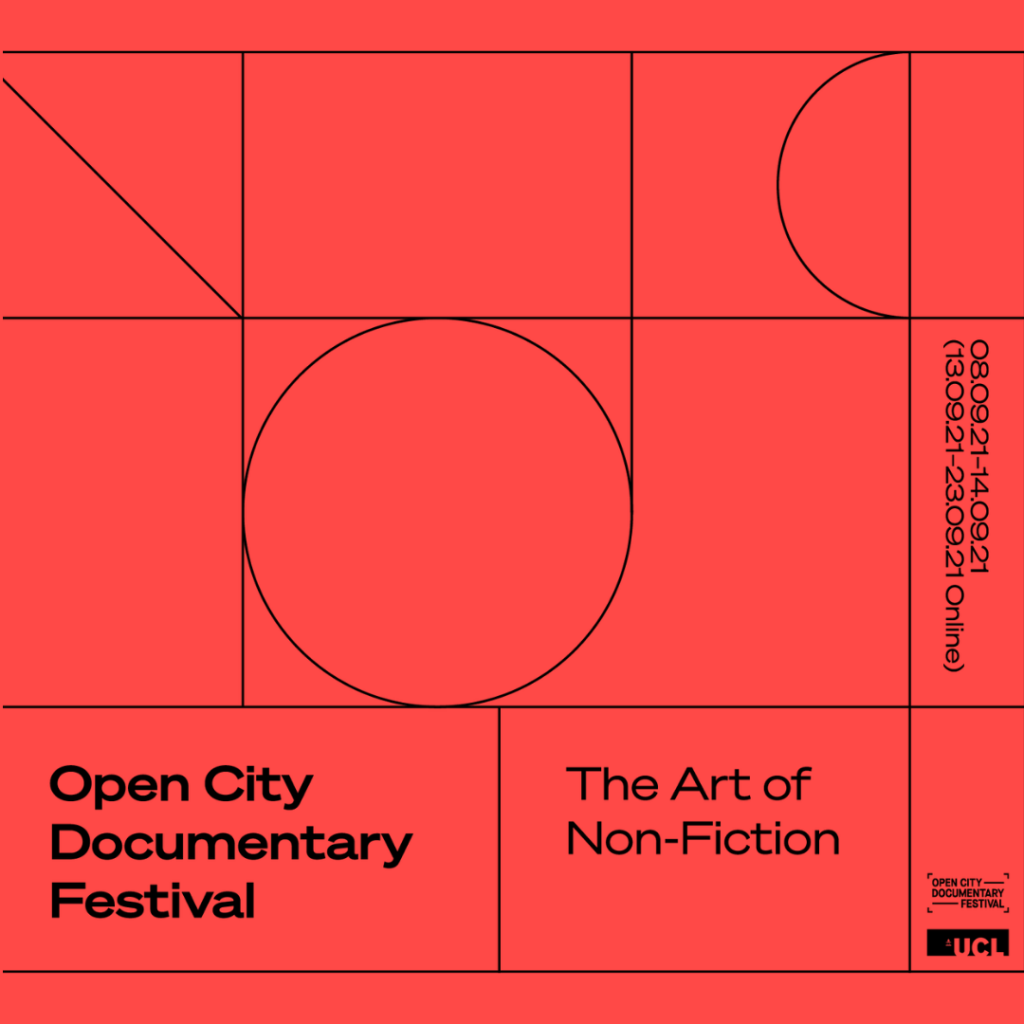
Celebrate the #ArtofNonFiction at Open City Documentary Festival‘s 11th edition, which runs across London cinemas and venues 8-14 September. We’re delighted to partner with the festival to present a screening of The Year of Discovery / El año del descubrimiento (dir. Luis López Carrasco; 2020)
Shot entirely on Hi-8 videotape in a bar in Cartagena, The Year of Discovery is a monumental work which excavates the legacy of 1992, proposing a counter-narrative to the official history of the year that Spain hosted the Olympics in Barcelona, the universal exposition Expo’92 in Sevilla, and celebrated the quincentenary of Columbus’s arrival in the America.
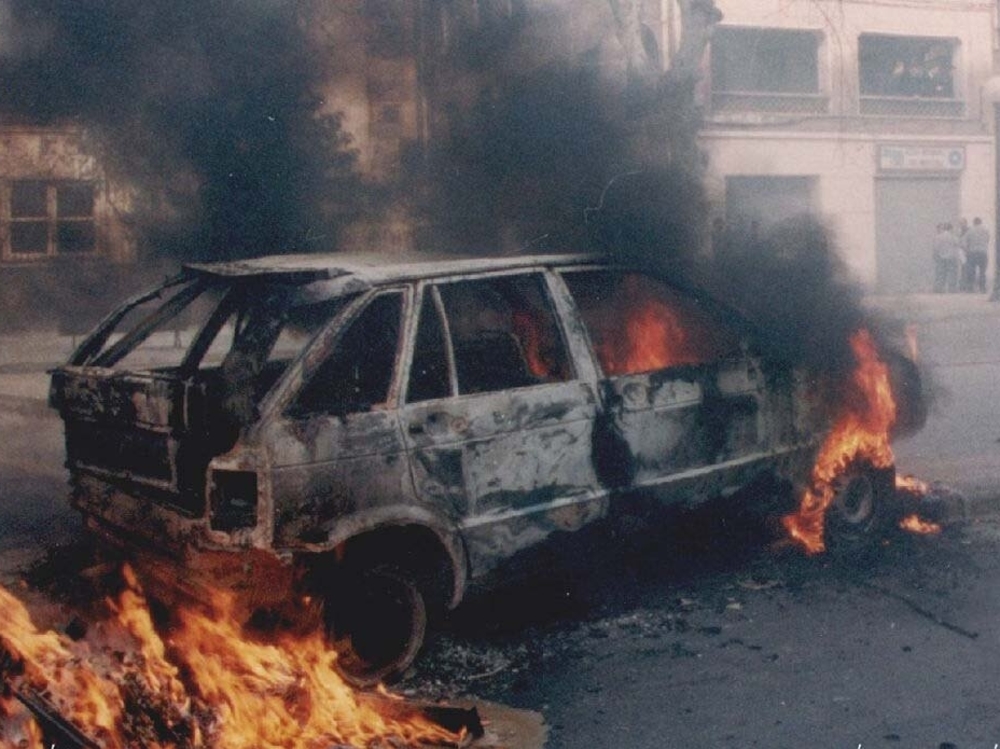
The Year of Discovery was hailed as one of the most important film works of 2020 and finally gets its first London cinema screening at the festival.
Showing: 10 Sep | 20.00 | @ICAlondon
To book tickets and find out more about the festival visit opencitylondon.com
«Te estoy amando locamente. Ciclo de cortometrajes LGTBI+»
Durante el mes de julio, el canal de Vimeo del Instituto Cervantes, en colaboración con la distribuidora cinematográfica Marvin & Wayne, acogerá ocho relatos diferentes de ocho cineastas con una mirada y un quehacer muy personal en el ciclo «Te estoy amando locamente. Ciclo de cortometrajes LGTBI+», que toma su nombre de la canción popularizada por Las Grecas en los años 70.
Los cortometrajes que componen este ciclo nos presentan historias personales, reflexiones, testimonios y retratos que dirigen la mirada hacia realidades infrarrepresentadas en el cine —y, cabría decir, en todas las manifestaciones artísticas—: son relatos que tratan, especialmente aunque no solo, sobre la identidad de género, sobre el amor homosexual y sobre la transexualidad.
¡Celebra con nosotros esta fiesta de la diversidad!
Programa completo: vimeo.com/showcase/te-estoy-amando-locamente,
▶ 6 de julio: «Una dedicatoria a lo bestia» (2019), de Nucbeade vimeo.com/557671872
▶ 9 de julio: «Después también» (2019), de Carla Simón vimeo.com/557676690
▶13 de julio: «Su» (2019), de Laia Foguet vimeo.com/557679177
▶16 de julio: «Víctor XX» (2015), de Ian de la Rosa vimeo.com/557683845
▶20 de julio: «Cantando en las azoteas» (2017), de Enric Ribes vimeo.com/557970147
▶23 de julio: «Snap» (2018), de Felipe Elgueta y Ananké Pereira vimeo.com/557989467
▶27 de julio: «Alma» (2018), de Santiago León Cuéllar vimeo.com/558009021
▶30 de julio: «El cuerpo de la mujer sin sombra» (2021), de Tamara García Iglesias vimeo.com/558011405
Todos los títulos estarán disponibles en el canal de Vimeo del Instituto Cervantes durante 48 h, a partir de las 20.00 h [GMT+2] del día indicado.
Organizan:
– Instituto Cervantes cervantes.es
– Marvin & Wayne marvinwayne.com/es
Celebrating the centenary of Luis García Berlanga’s birth
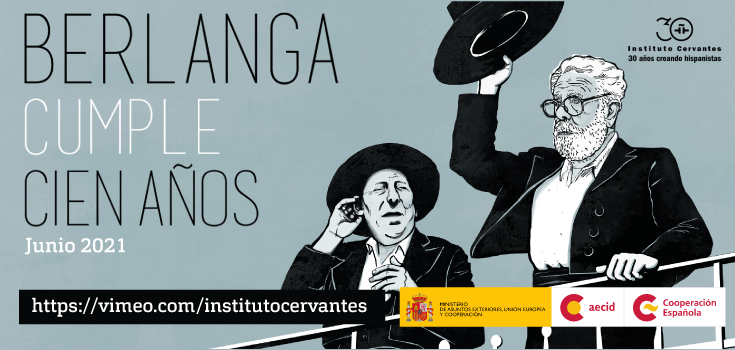
This June we have been celebrating the centenary of Luis García Berlanga’s birth, one of the great filmmakers of Spanish cinema. His long and fruitful cinematographic career, his unmistakable signs of identity as a creator, his corrosive humour and his work in directing, make him one of the best classic filmmakers of 20th century Spanish cinema.
In our library, you can borrow some of his most iconic DVD movies such as «Placido», «El verdugo» and «Bienvenido Mister Marshall», among others, and some books about him.
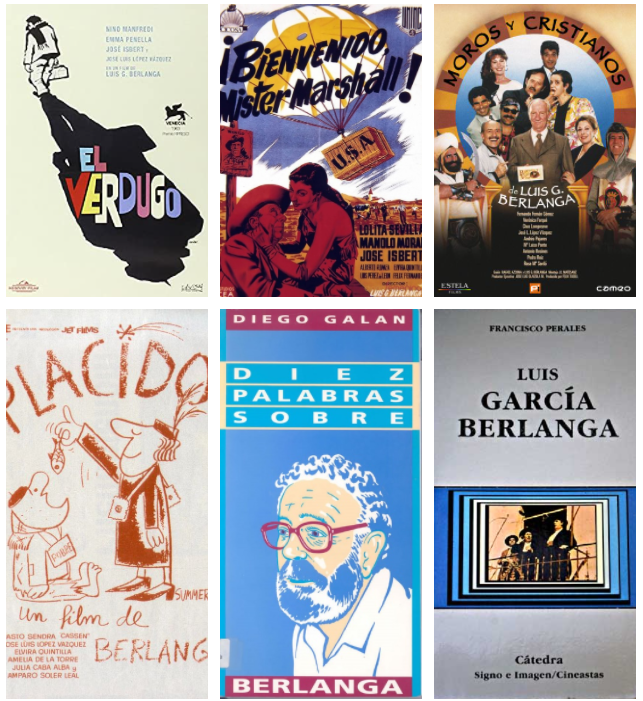
In 1980, Luis García Berlanga was interviewed in the TV programme A fondo:
We also recommend the consultation of Digitalia database – for users with a library card – where his name is mention in 140 books on Spanish cinema:
Celebrando el centenario del nacimiento de Luis García Berlanga

Este mes de junio hemos estado celebrando el centenario del nacimiento de Luis García Berlanga, uno de los grandes cineastas del cine español. Su larga y fructífera trayectoria cinematográfica, sus inconfundibles señas de identidad como creador, su humor corrosivo y su trabajo en la dirección, le hace ser uno de los mejores directores clásicos del cine español del siglo XX.
En nuestra biblioteca se pueden sacar en préstamo algunas de sus películas en DVD más icónicas como “Plácido”, “El verdugo” y “Bienvenido Mister Marshall”, entre otras, y también algunos libros sobre él.

En 1980, Luis García Berlanga fue entrevistado en el programa A fondo:
También os recomendamos que consultéis la base de datos Digitalia – para los usuarios con carnet de la biblioteca- en donde su nombre aparece mencionado en 140 libros sobre cine español
Centenario del nacimiento del cineasta Luis García Berlanga
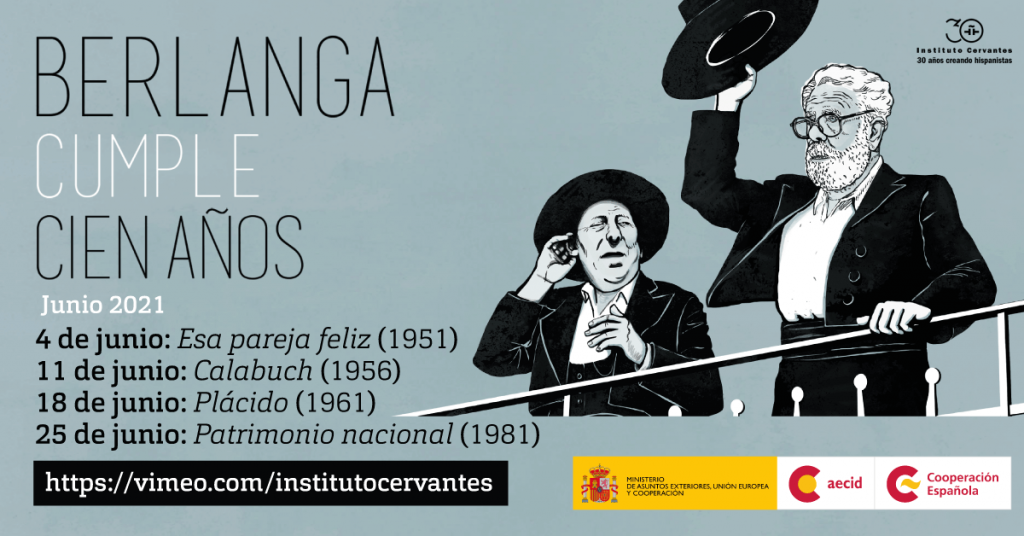
En el marco de la celebración del centenario del nacimiento del gran cineasta valenciano Luis García Berlanga (Valencia, 12 de junio de 1921-Madrid, 13 de noviembre de 2010), el Instituto Cervantes tiene previsto un completo programa de actividades que se inicia con el ciclo de cine en línea «Berlanga cumple cien años» que —en colaboración con la Filmoteca de la AECID, el ICAA y su Filmoteca Española, AC/E y la Academia de Cine— recupera cuatro de sus obras menos conocidas internacionalmente.
Programa completo en https://vimeo.com/showcase/centenarioberlanga, dentro del canal de Vimeo Instituto Cervantes.
![]() 4 de junio: «Esa pareja feliz» (1951), de Luis G. Berlanga y Juan Antonio Bardem https://vimeo.com/institutocervantes/esaparejafeliz
4 de junio: «Esa pareja feliz» (1951), de Luis G. Berlanga y Juan Antonio Bardem https://vimeo.com/institutocervantes/esaparejafeliz![]() 11 de junio: «Calabuch» (1956), de Luis G. Berlanga https://vimeo.com/institutocervantes/calabuch
11 de junio: «Calabuch» (1956), de Luis G. Berlanga https://vimeo.com/institutocervantes/calabuch![]() 18 de junio: «Plácido» (1961), de Luis G. Berlanga https://vimeo.com/institutocervantes/placido
18 de junio: «Plácido» (1961), de Luis G. Berlanga https://vimeo.com/institutocervantes/placido![]() 25 de junio: «Patrimonio nacional» (1981), de Luis G. Berlanga https://vimeo.com/institutocervantes/patrimonionacional
25 de junio: «Patrimonio nacional» (1981), de Luis G. Berlanga https://vimeo.com/institutocervantes/patrimonionacional
The 10th Spring Weekend of the London Spanish Film Festival is back
The 10th Spring Weekend of the London Spanish Film Festival comes back, 28 – 30 May 2021, after missing one very strange year, full of energy and positive vibes setting the mood for an exciting 17th edition in September.
To celebrate Spanish cinema and its artists, as part of this weekend, you’ll find the latest film by veteran Fernando Trueba, three impressive debuts by three promising women, a hopeful and moving reflexion on what life is… and a special screening of the latest treat from Maestro Almodóvar.
For the full programme go to www.londonspanishfilmfestival.com
LAS NIÑAS
Schoolgirls
dir. Pilar Palomero | with Andrea Fandos, Natalia de Molina, Zoe Arnao | Spain | 2020 | 97 min | cert. 15 | London premiere | In Spanish with English subtitles
Celia is an 11-year-old girl studying at a nun’s school in 1992. She’s a responsible student and a considerate daughter but the arrival of a new classmate will open a little window Celia is willing to look out from to discover about the outside world. Together with her group of friends she’ll give her first steps into adolescence and first-times even if that means confronting her mother and questioning everything that meant comfort and security. The film has won several awards among which Best Film, Best New Director, Best
Cinematography and Best Original Screenplay Goya Awards.
Fri 28 May | 6.30pm | £13, conc. £11
EL OLVIDO QUE SEREMOS
Memories of My Father
dir. Fernando Trueba, with Javier Cámara, Nicolás Reyes Cano, Juan Pablo Urrego | Colombia | 2020 | 136 min | cert. PG | In Spanish, Italian and English
with English subtitles | Distributed by Curzon
Trueba’s latest film tells the story of Héctor Abad Gómez, one of Colombia’s most beloved national heroes, through the eyes of his son. He balances a nuanced portrait of Abad Gómez’s family life in Medellín and the harsh reality of the country in the turbulent 1970s and 1980s, in which corruption is common and the government cannot be criticised. Based on the book written by Abad Gómez’s son, Memories of My Father is a memorable work, a love story and the portrait of a man fighting for the basic human rights of his
people: food, water and adequate shelter.
Fri 28 May | 8.35pm | £13, conc. £11
Sat 29 May | 5.50pm | £13, conc. £11
LA VOZ HUMANA
The Human Voice
dir. Pedro Almodóvar, with Tilda Swinton | Spain | 2020 | 30 min | cert. PG | In English and Spanish with English subtitles
Jean Cocteau wrote The Human Voice in 1928 and, since then, many artists have staged or filmed their own vision of this woman’s dramatic moments after her lover of the last few years leaves her to get married with to another woman. Almodóvar’s stunning version brings to The Human Voice his sense of aesthetics, of rhythm and his peculiar, subtle sense of humour, making the pièce his own. Chameleonic Swinton, in what seems a wonderful and perfect tuning with Almodóvar, captures the essence of his style bringing to it some
delightful British exquisiteness. A must.
The film will be followed by a 40 min video-Q&A with Pedro Almodóvar and Tilda Swinton with Mark Kermode. It will be preceded by a video-presentation by Prof. Maria Delgado
Sat 29 May | 4.15pm | £13, conc. £11
LA INNOCÈNCIA
La inocencia | The Innocence
dir. Lucia Alemany | with Carmen Arrufat, Laia Marull, Sergi López, Joel Bosqued | Spain | 2019 | 92 min | cert. 15 | London premiere | In Catalan and Spanish with English subtitles
Lis is a teenager whose dream is to become a circus artist and go traveling. While she knows she’ll have to confront her parents and fight for it, she spends the summer playing around with her friends and with her boyfriend, a few years older than herself and the relationship with whom she tries to keep hidden from the constant gossip of the neighbours. Lucia Alemany’s impressive first feature film is a fresh coming-of-age story that captures perfectly the rural and festive mood without losing any realism nor honesty.
Sat 29 May | 8.45pm | £13, conc. £11
MY MEXICAN BRETZEL
by Nuria Giménez | Spain | 2019 | 73 min | cert. PG | London premiere | In English
Giménez’s debut film offers, through archive footage of home made movies, a glimpse into the life of a wealthy European couple, Léon and Vivian Barrett, after WW2 and up to the 1960s. The quality of the footage is superb and is accompanied by text from Vivian’s diary offering details of their lives, her thoughts, gossip… Mesmerising and compelling, this is a clever work of direction and of editing by Giménez, and has won her, among others, the Found Footage Award at the Internation Film Festival of Rotterdam last year.
Sun 30 May | 6.10pm | £13, conc. £11
LA VIDA ERA ESO
That Was Life
dir. David Martín de los Santos, with Petra Martínez, Anna Castillo, Florin Piersic Jr., Ramón Barea | Spain/Belgium | 2020 | 109 min | cert. PG | UK premiere | In Spanish and French with English subtitles
When María and Verónica end up meeting and sharing a hospital room in Belgium, the only thing they have in common is that they are Spaniards who came to work to this country with the hope to find more opportunities than back at home. Slowly a bond grows between them and one of them will start a
journey to Almería, where the roots of the other are, initially to meet her family, finally to discover principles beyond those on which she had based her whole life. The film is poignant in his humble and intimate approach. The subtly nuanced acting of Petra Martínez in the lead role as a woman pushing herself
out of the boundaries of the role in which she felt confined, adds emotion to this wonderful film.
Sun 30 May | 7.55pm | £13, conc. £11
The Galician Film Forum celebrates the Day of Galician Literature with its premiere of ‘Nación’ in the UK
- The London-based organisation is continuing to hold its events despite the pandemic by screening the latest film from Margarita Ledo online
- On Wednesday 19 May there will be a live online Q&A with the director
- The film will be available from 15 to 23 May via Vimeo On Demand and only in the UK
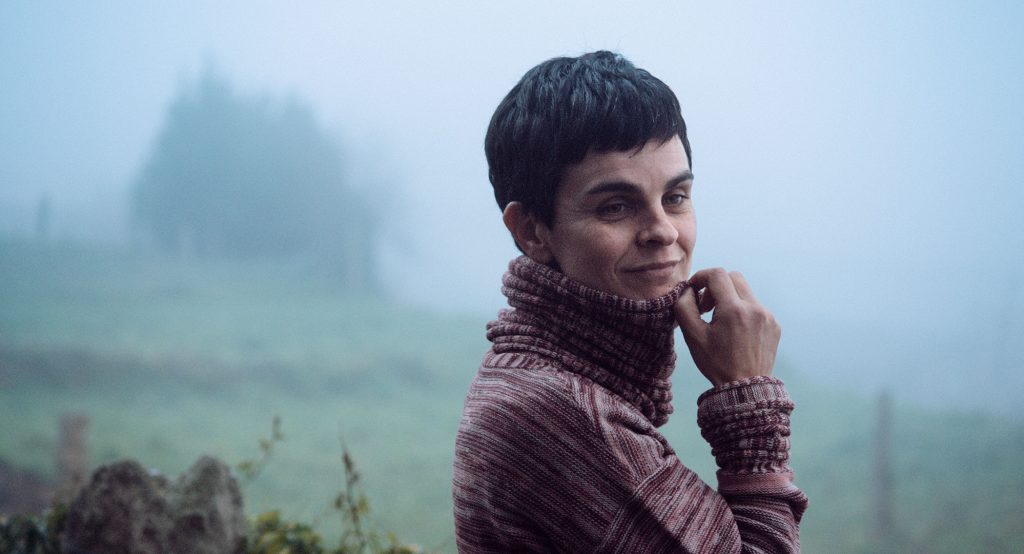
The London-based Galician Film Forum (GFF) will be celebrating the Day of Galician Literature this year with the UK premiere of ‘Nación’, the latest film from Margarita Ledo. From 15 to 23 May, the film will be available on the platform Vimeo On Demand exclusively for viewers based in the UK. There will also be an online Q&A with the director on Wednesday 19 May at 7pm British time which will be shared live on the GFF’s social media channels. The event has been supported by the Office for Scientific and Cultural Affairs at the Spanish Embassy in London.
The film will be screened in Galician with English subtitles and viewers will be able to rent it for 48 hours for £3.95 (the number of tickets is limited). This screening takes place seven weeks after the film premiered at cinemas in Spain, where it is still showing. ‘Nación’ was shown for the first time at the 17 Festival de Sevilla where it won the prize for Best Direction of a Spanish Film. It has also received the Mestre Mateo 2021 award for Best Documentary.
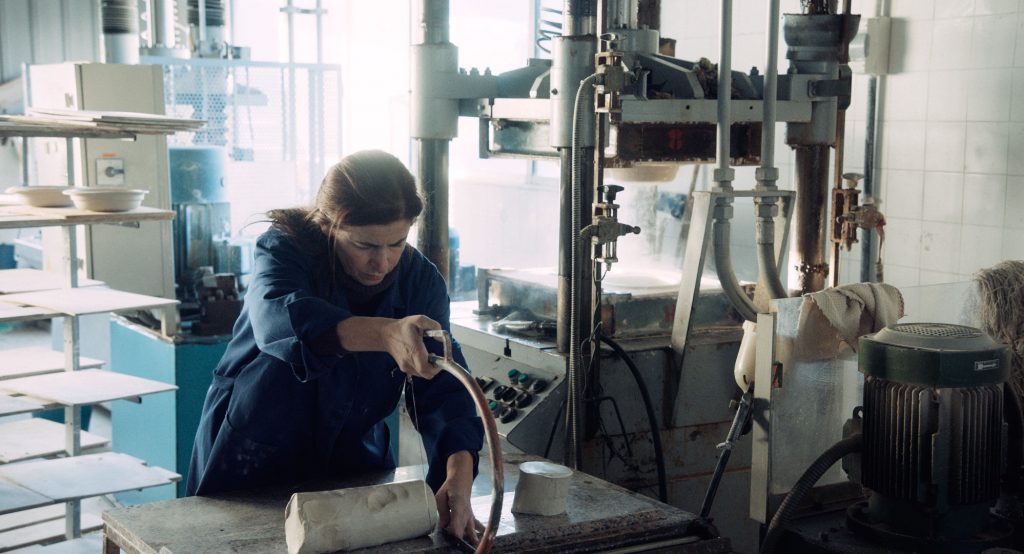
A struggle without end
In this non-fiction film, Margarita Ledo looks into how long it took women to receive rights ‘not only to vote, but to attain a paid job and to have the opportunity to become independent. In summary, how long it took us to become Nation’. At the core of the film is the closure of the Pontesa ceramics factory in 2001 and how, twenty years after the long-awaited sentence on the pending debt claim, a group of workers recalls the symbol of their individual liberty, their economic freedom and their struggle as a union.
These workers have kept the fight for women’s rights in Spain alive in the twentieth century. Their life story is told through the presence of a sphinx, played by Eva Veiga, who seeks out the memories of the women working in the textile, ceramic and conserves industries and announces voices and archives that link different times and bodies together.
In ‘Nación’, archive images are interspersed with acted scenes from Mónica Camaño, Mónica de Nut, Laura Martínez Iglesias and Xoana Pintos. The film also includes some ex-workers from Pontesa including Nieves Pérez Lusquiños, Manuela Nóvoa Pérez, Ester García Lorenzo, Carmen Portela Lusquiños e Carmen Álvarez Seoane.
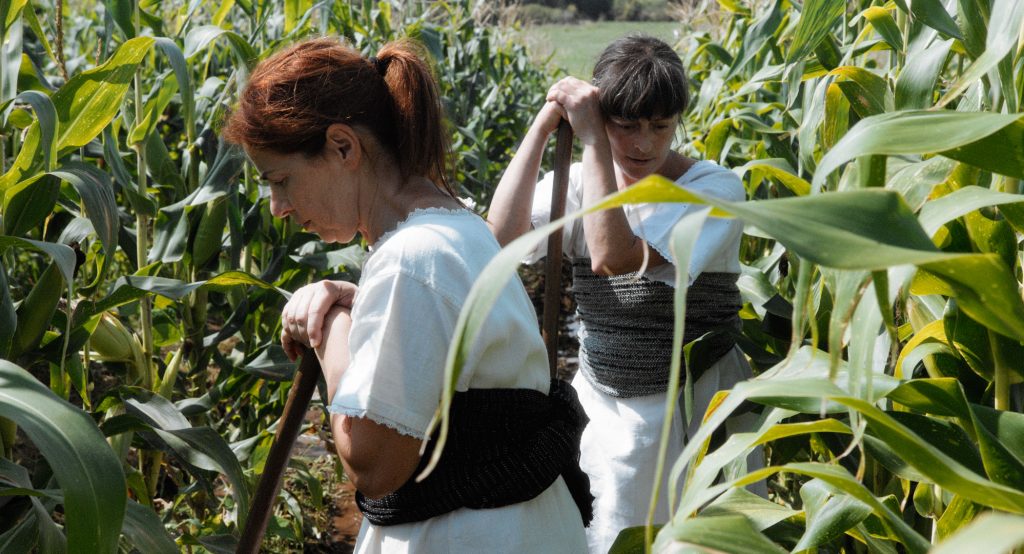
Margarita Ledo Andión (1951, Castro de Rei, Lugo) is a very important cultural figure who is known for her work as a filmmaker and a writer. She is also a professor in audiovisual communication at the University of Santiago de Compostela where she was also dean. Her first book, a book of poems called ‘Parloar cun eu,cun intre,cun inseuto’ was published in 1970 followed by further poetry, fiction essays and research.
She has founded and directed several publications that focus on the importance of the Galician language and tend to have a militant spirit behind them. Her filmography includes the two feature-length films ‘Santa Liberdade’ (2004), ‘Liste, pronunciado Líster’ (2007) and the fictional film ‘A cicatriz branca’ (2012) which was based on her novel ‘Porta Blindada’. She has also directed various experimental short films and documentaries. In 2017, the international film festival Documenta Madrid held a retrospective for her. She was awarded the National Prize of Galician Culture in cinema and audiovisual production in 2008 and the Otero Pedrayo award in 2017. She is also a fellow of the Royal Galician Academy.
Tickets ‘Nación’:https://vimeo.com/ondemand/nacion/
El Galician Film Forum estrena ‘Nación’, la última película de Margarita Ledo, en el Reino Unido
● La organización londinense prosigue con su actividad a pesar de la pandemia con la proyección online del último film de Margarita Ledo
● El miércoles 19 está previsto un encuentro en directo por vía telemática con la directora
● La película estará disponible entre los días 15 y 23 de mayo en la plataforma Vimeo On Demand en exclusiva para el Reino Unido

El Galician Film Forum (GFF) de Londres celebra este año el Día de las Letras Galegas con el estreno en el Reino Unido de ‘Nación’, el último film de Margarita Ledo. Así, entre los días 15 y 23 de mayo, la película estará disponible en la plataforma Vimeo On Demand en exclusiva para el Reino Unido. Además, también está previsto un encuentro en línea con la directora el miércoles 19 de mayo, a las 7 de la tarde (horario británico), que se retransmitirá en directo a través de las redes sociales del GFF. Esta actividad es posible gracias al patrocinio de la Oficina para Asuntos Culturales y Científicos de la Embajada de España en Londres.
El film se va a exhibir en versión original con subtítulos en inglés y el alquiler por 48 horas tendrá un coste de 3,95 libras; además, el número de entradas estará limitado. Esta proyección en el Reino Unido tiene lugar siete semanas después de su estreno en las salas comerciales en España, donde aún puede encontrarse en cartelera. ‘Nación’ se estrenó en el 17 Festival de Sevilla, donde se alzó con el premio a la Mejor Dirección de Película Española, y recibió el Maestro Mateo 2021 al Mejor Documental.

Una lucha inacabada
En este filme de no ficción, Margarita Ledo aborda lo mucho que tardaron las mujeres en tener derechos, “no solamente en votar, sino en lograr un trabajo asalariado y en la posibilidad de ser independientes. En resumen, en lo mucho que nos llevó ser Nación”. El eje argumental es el cierre de la fábrica de cerámica Pontesa en 2001 y como, veinte años después, mientras esperan la sentencia sobre la reclamación de la deuda pendiente, un grupo de trabajadoras recuerda el símbolo de su libertad individual, su emancipación económica y su lucha sindical.
Esas trabajadoras mantienen viva la reivindicación de los derechos de la mujer en la España del siglo XX. La historia de sus vidas se desarrolla en presencia de una esfinge, encarnada por Eva Veiga, que reclama la memoria de las operarias del textil, la cerámica y la conserva y anuncia voces y archivos que engarzan tiempos y cuerpos diferentes.
En ‘Nación’ se alternan las imágenes de archivo y las interpretaciones de Mónica Camaño, Mónica de Nut, Laura Martínez Iglesias y Xoana Pintos con la participación de las extrabajadoras de Pontesa: Nieves Pérez Lusquiños, Manuela Nóvoa Pérez, Ester García Lorenzo, Carmen Portela Lusquiños y Carmen Álvarez Seoane.

Margarita Ledo Andión (1951, Castro de Rei, Lugo) es una relevante figura de la cultura conocida por sus facetas de cineasta y escritora. Además, es catedrática de Comunicación Audiovisual en la Universidad de Santiago de Compostela, donde también ejerció como decana. Publicó su primer libro, el poemario ‘Parolar cun eu,cun intre,cun inseuto’, en 1970, y con el tiempo verían la luz otros títulos de poesía, narrativa, ensayo e investigación.
A lo largo de su trayectoria vital fundó y dirigió diversas publicaciones con especial foco en la reivindicación de la lengua gallega y de espíritu militante. Su filmografía consta de los largometrajes ‘Santa Liberdade’ (2004), ‘Liste, pronunciado Líster’ (2007) y la ficción ‘A cicatriz blanca’ (2012), basada en su novela ‘Porta blindada’. También ha dirigido varias piezas cortas experimentales y documentales. En el 2017 el festival internacional Documenta Madrid le dedicó una retrospectiva. Fue Premio Nacional de la Cultura Gallega 2008 en Cine y Audiovisual y Premio Otero Pedrayo 2017 y es numeraria de la Real Academia Gallega.
Entradas ‘Nación’:https://vimeo.com/ondemand/nacion/
Cortos en femenino
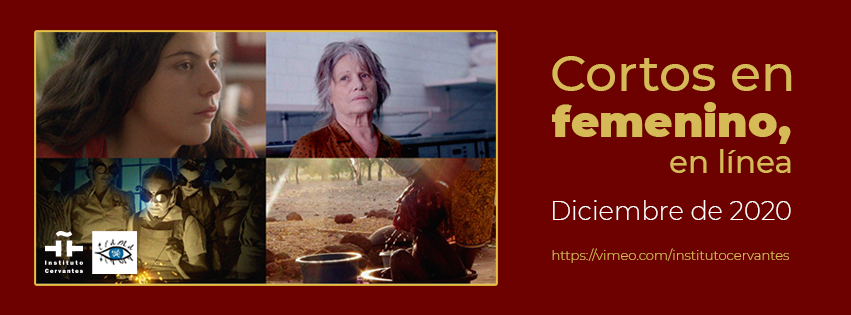
Durante el mes de diciembre, el Instituto Cervantes ofrece el ciclo en línea «Cortos en femenino». Diseñado por la coordinadora de festivales de mujeres en España, Trama, son cuatro ejemplos muy diferentes de la producción de cortometraje actual que muestran personajes femeninos diversos: dos cortos de ficción, «Centrifugado» y «No me despertéis», que rompen las expectativas de cada uno de sus géneros; el corto experimental «Dúctiles», que abre el imaginario sobre la representación de las mujeres; y el corto de montaje «Quand j’étais petit», que se abre hacia el entorno africano.
PROGRAMA
▶ 7 de diciembre: «Dúctiles» (Marisa Benito, 2018)
▶ 14 de diciembre: «Centrifugado» (Mireia Noguera, 2017)
▶ 21 de diciembre: «No me despertéis» (Sara Fantova, 2018)
▶ 28 de diciembre: «Quand j’étais petit» (Elena Molina, 2015)
The 16th London Spanish Film Festival is here
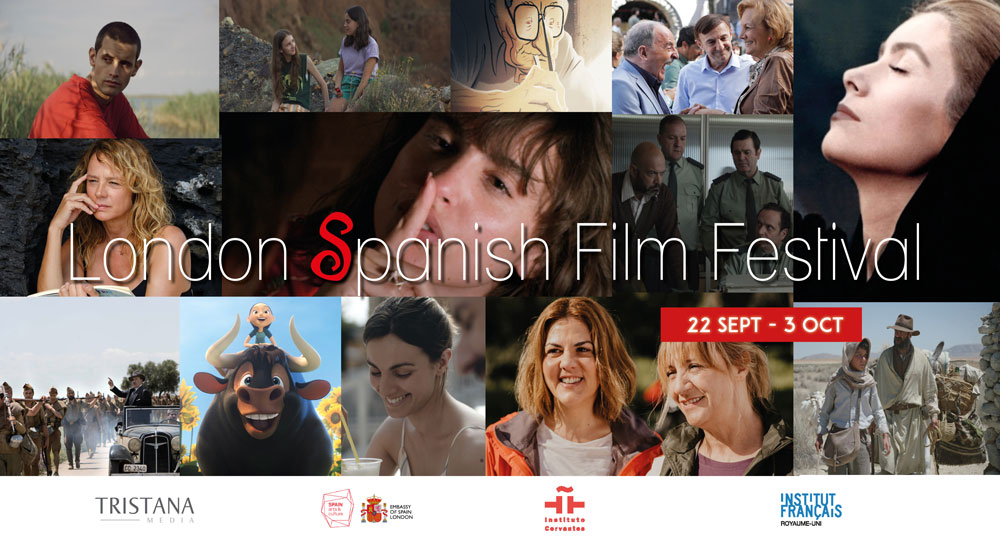
The London Spanish Film Festival, now in its 16th edition, comes again to Ciné Lumière, from September 22nd to October 3rd, with an exciting selection of some of the best films made in Spain.
Most of the films are UK premieres and probably your only chance to watch them! Thecore program and Basque and Catalan Windows offer a variety of films covering many genres and showing the wealth of talent Spain has to offer.
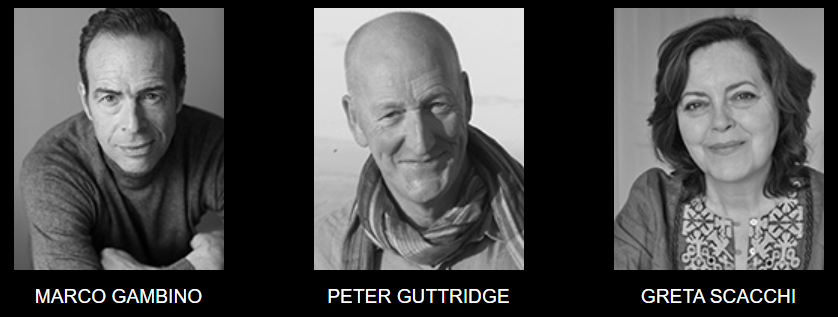
This year the Jury who will award the Best Film prize is formed by Greta Scacchi, Peter Guttridge and Marco Gambino.
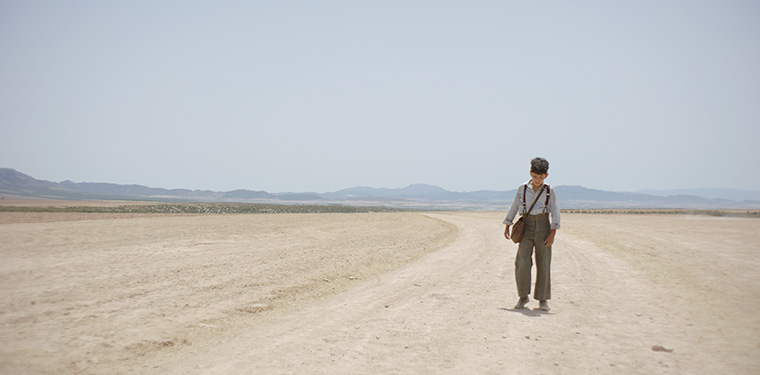
Don’t miss the chance to watch Out in the Open, directed by Benito Zambrano is a breath-taking thriller, gorgeously-shot Western, boasting the stunning cinematography of Pau Esteve Birba.
A boy runs away from home, dashing through the heartlands. Leaving his penniless family behind him, he is desperate to reach the city and earn a living. But his pursuers are giving chase… Out in the open, he finds a shepherd who offers protection, a mysterious man who spent many years in Morocco before the Civil War.
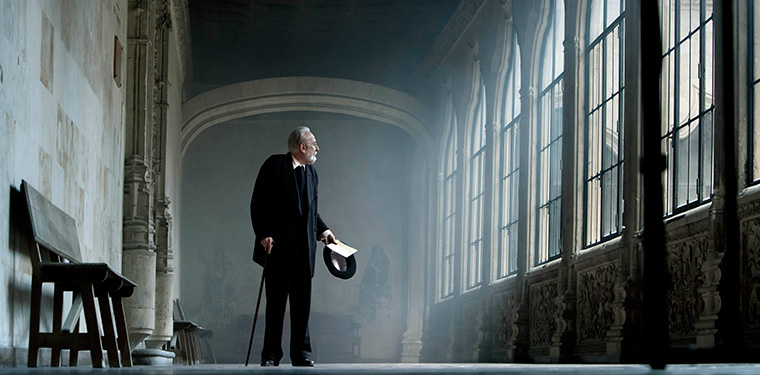
Highlights include While at War by Academy Award winner Alejandro Amenábar, his seventh feature film, which takes us back to the days of the Spanish Civil War outbreak and Miguel de Unamuno’s fight in Salamanca against everyone to stand for what he believed was right.
Not just another Spanish Civil War film, While at War goes beyond the depiction of one of its chapters, but shows the dangers of political passivity and the dignity of the famous philosopher and writer who fought angainst everyone, right and left, to stand for what he believed in.
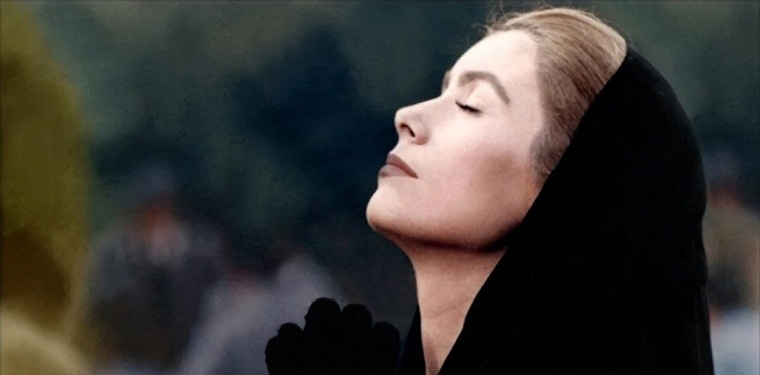
The program also includes a special screening of Luis Buñuel’s Tristana starring Catherine Deneuve, to celebrate the 50th anniversary of the film. Now a classic, Tristana caused a stir with his exploration of decadence, repression and desire in Toledo, which was based on Benito Pérez Galdós’s novel by the same title and written in 1892.
Tristana is a young woman who remains orphan and goes to the house of don Lope under his protection. Don Lope falls under the spell of her and takes up the role of protector/husband. Things start changing when she falls in love with a young artist and the until then submissive Tristana starts finding her own voice.
